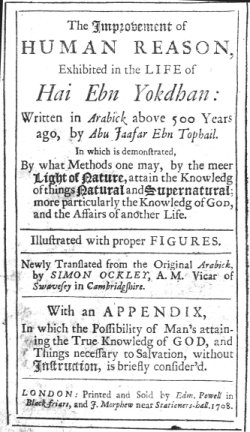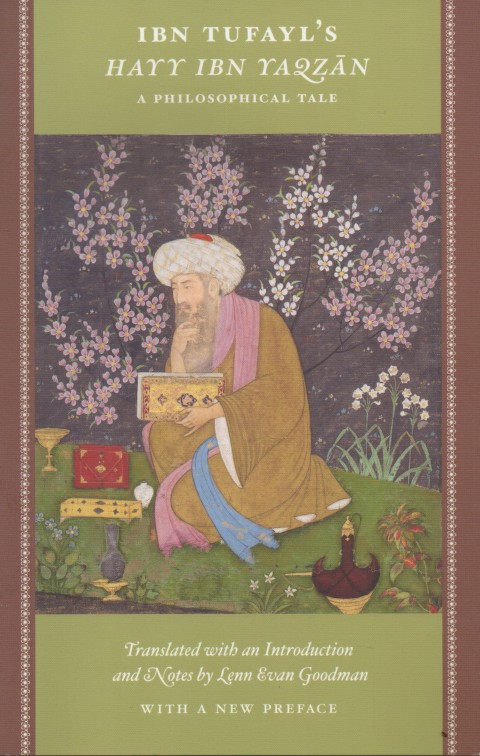|
The first of February apparently was Robinson Crusoe Day, with a plethora of activities, books, lesson plans and more being offered around the Internet, for readers small and not-so-small. It’s Feb 1 because that’s the day Alexander Selkirk — who may have been a key inspiration for Robinson Crusoe — was apparently rescued from the island of Juan Fernandez. Certainly, there are other possible models, among them a narrative by Ibn Tufayl that was “a sensation among intellectuals in Daniel Defoe’s day“:
Nearly eleven years back, on the occasion of Ibn Tufayl’s narrative being adapted for children, Martin Wainwright argued that “Tufayl’s footprints mark the great classic”, Robinson Crusoe.
That may be. But whether or no the 12th-century Hayy ibn Yaqzan (Alive, son of Awake) influenced Defoe’s 1719 desert-island novel, the Andalusia-born philosopher’s work is interesting on its own two feet.
The narrative tells the story of an orphaned boy, Hayy, who is raised in the wild by a gazelle, and how he comes to grips with human reason and human society. Some call it a philosophical narrative, some a coming-of-age novel, some a compendium of Islamic science, some proto-science fiction. The narrative has inspired numerous adaptations; in addition to the one in 2003, in 2011 Iranian-American director Mohammad Ghaffari adapted it to the stage, also apparently suited for children, as it continued in Minneapolis’s Children’s Theatre Company.
Hayy ibn Yaqzan was also re-translated by Lenn E. Goodman and published in 2003.
An open-source version of Hayy ibn Yaqzan’s original English translation, by Simon Ockley, pub. 1708. Not exactly suited to the modern reader, but: Via the Gutenberg project
|




 Poasis II: Selected Poems 2000-2024
Poasis II: Selected Poems 2000-2024 “Todesguge/Deathfugue”
“Todesguge/Deathfugue” “Interglacial Narrows (Poems 1915-2021)”
“Interglacial Narrows (Poems 1915-2021)” “Always the Many, Never the One: Conversations In-between, with Florent Toniello”
“Always the Many, Never the One: Conversations In-between, with Florent Toniello” “Conversations in the Pyrenees”
“Conversations in the Pyrenees” “A Voice Full of Cities: The Collected Essays of Robert Kelly.” Edited by Pierre Joris & Peter Cockelbergh
“A Voice Full of Cities: The Collected Essays of Robert Kelly.” Edited by Pierre Joris & Peter Cockelbergh “An American Suite” (Poems) —Inpatient Press
“An American Suite” (Poems) —Inpatient Press “Arabia (not so) Deserta” : Essays on Maghrebi & Mashreqi Writing & Culture
“Arabia (not so) Deserta” : Essays on Maghrebi & Mashreqi Writing & Culture “Barzakh” (Poems 2000-2012)
“Barzakh” (Poems 2000-2012) “Fox-trails, -tales & -trots”
“Fox-trails, -tales & -trots” “The Agony of I.B.” — A play. Editions PHI & TNL 2016
“The Agony of I.B.” — A play. Editions PHI & TNL 2016 “The Book of U / Le livre des cormorans”
“The Book of U / Le livre des cormorans” “Memory Rose Into Threshold Speech: The Collected Earlier Poetry of Paul Celan”
“Memory Rose Into Threshold Speech: The Collected Earlier Poetry of Paul Celan” “Paul Celan, Microliths They Are, Little Stones”
“Paul Celan, Microliths They Are, Little Stones” “Paul Celan: Breathturn into Timestead-The Collected Later Poetry.” Translated & with commentary by Pierre Joris. Farrar, Straus & Giroux
“Paul Celan: Breathturn into Timestead-The Collected Later Poetry.” Translated & with commentary by Pierre Joris. Farrar, Straus & Giroux